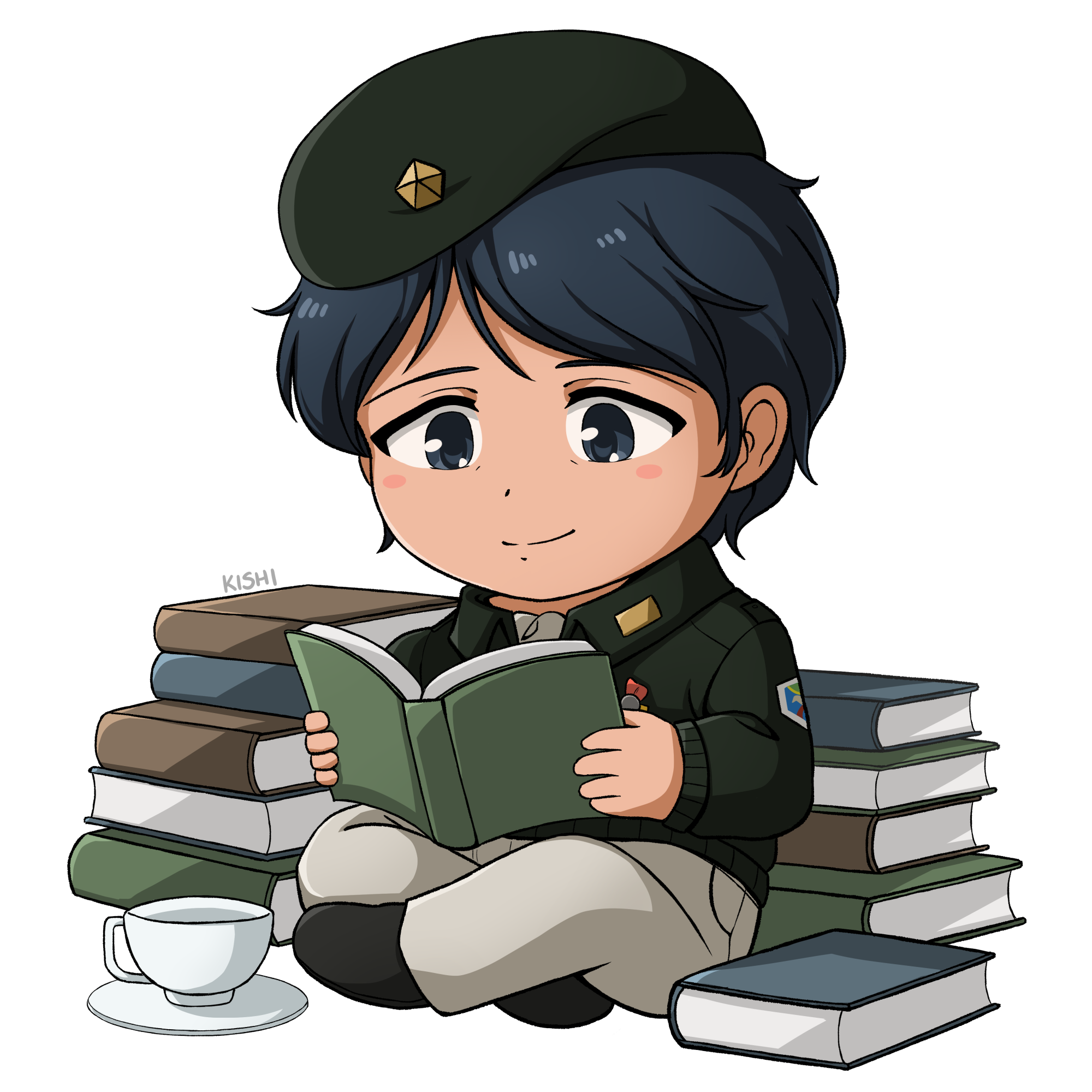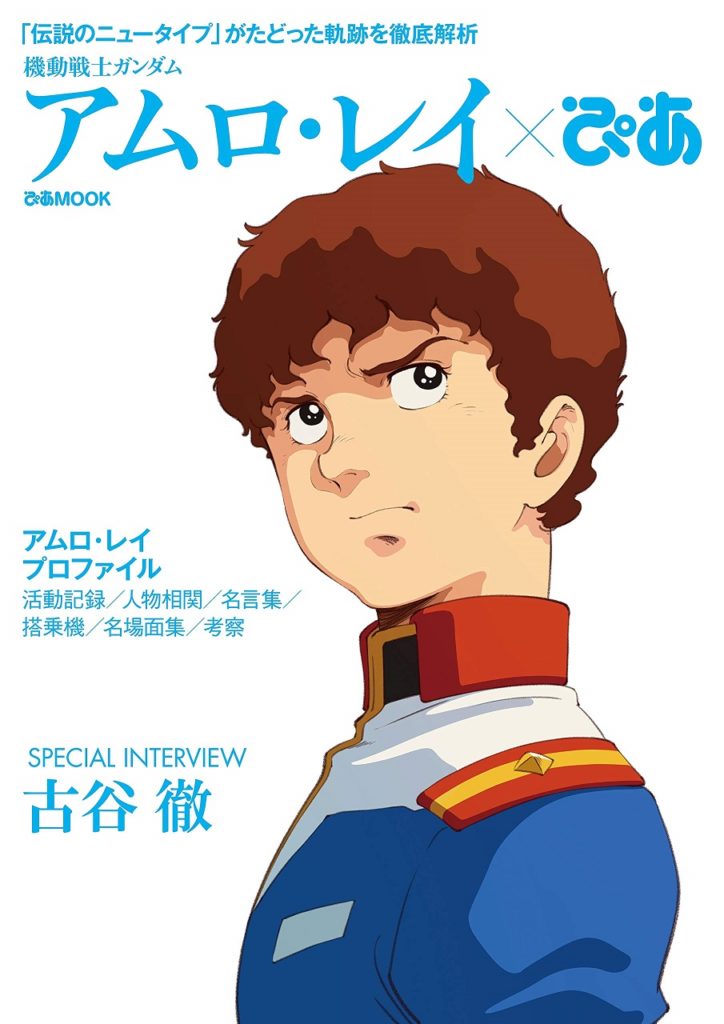
[originally posted 22 June 2023]
The following is a translation of the interview with Tōru Furuya from the Amuro Ray Pia Mook, published by Pia (ぴあ) in 2020.
Meeting Amuro was a major turning point in his life as an actor
Please tell us how you feel about the 40th anniversary of Mobile Suit Gundam.
When I am told once again that it has been 40 years, I’m surprised at how long I’ve been playing Amuro Ray. However, I have been playing the role of Amuro for a long time, and I am still playing the same 15-year-old Amuro as I was then, so I don’t feel that much time has passed.
I met Amuro when I was just 25 years old, not long after graduating from university, when I returned to my career as a voice actor. At the time, I was still struggling with the image of the hot-blooded heroes I had played before, such as Hyuma Hoshi in Star of the Giants, and it was at that time that I encountered the role of Amuro Ray in Mobile Suit Gundam (hereafter referred to as Gundam). I would be playing the role of a very sensitive and pure boy who does not want to fight even though he is the main character in a robot anime, so I knew intuitively that this was a character and a work that would definitely be a big step up in my future acting career.
I was then chosen to play the role of Amuro, and when the anime actually started, my intuition became a reality, which gave me great confidence as a performer and allowed me to broaden my acting range and play different kinds of characters.
When Star of the Giants became a big hit, I thought “voice acting is great,” but when I met Gundam, I realized how interesting anime voice acting really is, and it made me want to continue doing this job forever. In that sense, Gundam is the work that decided my life. I never dreamed that the Gundam fever at that time would continue for 40 years, and that I would continue to play Amuro almost every year in various media such as games and commercials, not just anime.
Please tell us about the time when you were recording for Gundam.
For me at the time, being a naive and shy protagonist was a very fresh experience, and I still vividly remember the recording of Gundam.
Going back a little bit, I used to work as a child actor. When I was 13 years old, I was given my first opportunity to voice the main character in an anime titled Pirate Prince, and two years later, I was cast as the main character, Hyuma Hoshi, in Star of the Giants.
After that, I continued to work on robot and hero things such as Steel Jeeg and Groizer X, and before I knew it, all I was playing were hot-blooded characters. Among them, Star of the Giants was on the air for a particularly long time and had a strong image of the character, so it became ingrained in my body and my acting, and I think that’s what people around me expected from me. I was in such a dilemma that even though I thought I was acting a part properly, it all came out sounding like Hyuma.
Also, I myself am rather soft-spoken, and my personality is completely different from the characters I often played at the time. Perhaps there was some discomfort there. So meeting Amuro was very fresh and sympathetic. An introverted and meticulous boy who seems to be a bit timid. If I didn’t get a passing score with this character, I wouldn’t grow as a voice actor, and I wanted to seize this role and break out of the “Hyuma Hoshi shell”. I still remember going to the audition with this strong feeling.
Amuro’s first line in Gundam is “Haro, how are you today?” What I focused on during this recording was to relax and talk like a daily conversation. The moment I was able to make that utterance, I felt something like a response inside of me, like, “Okay, I can do it!”
Did you have your own ideas about how to perform?
Generally I have my own thoughts about it, but sometimes I consult with the sound director. Around the time of Gundam, I confirmed the dialogue and created the role through communication with Matsuura-san (Noriyoshi Matsuura), the sound director. Matsuura-san may have represented Director Tomino’s (Director Yoshiyuki Tomino) way of thinking, but I don’t think he had much direct contact with the director.
As an example, you may have noticed that the impression of Amuro from Gundam changed considerably between the beginning and the end of the One Year War. The boy grew into a young man through his experience of war, and during that time he also awakened as a Newtype. Amuro became aware of this, and even his facial expressions and words became more tough and masculine. I was careful not to overlook such subtle changes and his growth.
Then came Mobile Suit Zeta Gundam (hereafter referred to as Zeta) and Mobile Suit Gundam Char’s Counterattack (hereafter referred to as Char’s Counterattack), and what I kept in mind for each of these works was the tone of voice depending on the age of the character. Amuro was 15-16 years old at the time of Gundam, so I was conscious of his voice, which had a somewhat boyish quality to it. Especially in the beginning of the story, I wanted to show the introverted and timid side of him, who is still childish and unable to express his feelings clearly, so I purposely spoke in a stumbling manner.
On the other hand, Amuro in Zeta is now 23 years old, and has some self-confidence along with the awareness that he is an adult. However, he knows that the circumstances surrounding him are not good, and that he, a Newtype, was regarded as a dangerous element and was under house arrest. Therefore, I tried to lower the tone of my voice a little, and since stuttering was no longer necessary, I conversely focused on his mature way of expressing his intentions.
Furthermore, when it comes to Char’s Counterattack, his position has changed, and he now has subordinates as an officer in the military. It’s as if he can’t act entirely on his own because he has a responsibility. Since he was completely grown up, I put his position and situation into his voice. Age is the biggest factor, after all. I feel that as Amuro ages, the tone of his voice gradually lowers, and similarly his way of speaking matures.
I feel that a character’s growth and emotional changes occur naturally and mature as they act according to the story, rather than being consciously done by looking at the script.
We, the performers, also experience various battlefields, encounters with people, and farewells together with the characters. I think it’s more likely that as you accumulate such experiences, you’ll find yourself changing before you know it. That’s why, when the final episode of Gundam ended, I felt a sense of relief and said, “I’m so glad the war is over” and “I don’t want to go to the battlefield again.”
Perhaps because of that thought, when I heard that they were going to make Zeta, I thought, “Are we going to war again?!” (laughs).
Shūichi Ikeda (who played Char Aznable) felt exactly the same way at the time.
I heard that too. At that time, Gundam and Space Battleship Yamato (hereafter, Yamato) were the two great science fiction anime. But Yamato had sequels made one after another, and there was no sign of it ending at all. On the other hand, Director Tomino said when the theatrical version of Gundam was over, “I will never make a sequel.” About three years later however, there indeed was talk of a sequel, and everyone was surprised.
Disliking playing Amuro in Zeta
When the production of Zeta was decided, did you receive an offer to appear immediately?
If I remember correctly, the first thing I heard was that a sequel to Gundam would start, and that the main character would be a new character instead of Amuro. I think it was a little later that I received an offer to appear.
However, when it was decided that I would actually be appearing again as Amuro, I learned about Amuro’s position in Zeta, or rather, the situation he was placed in, and thought, “What an uncool Amuro…” That was my honest impression (laughs).
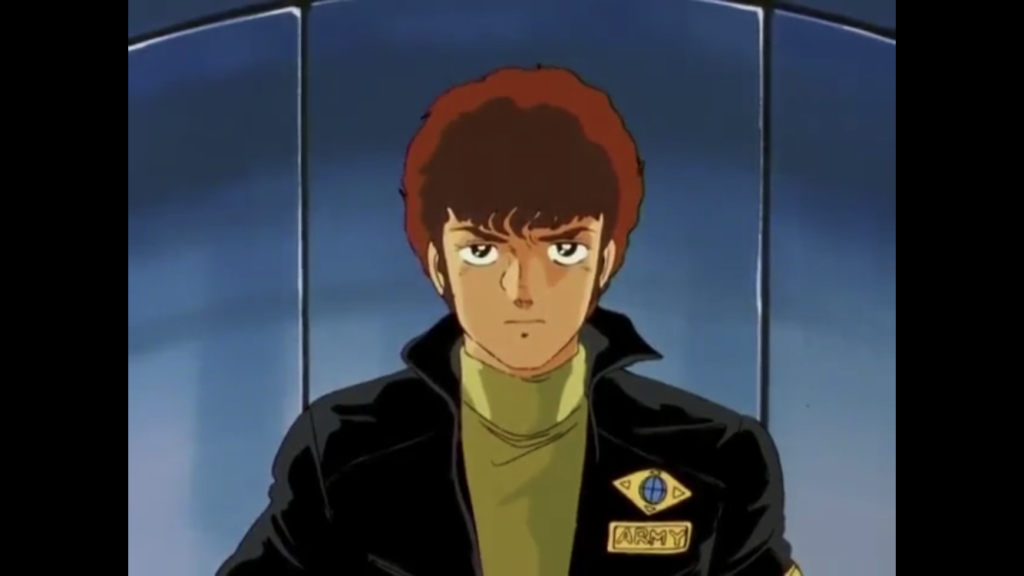
Amuro in Gundam was still a 15-year-old kid, but he was really cool, wasn’t he? He fought alone against Char, the Red Comet feared by everyone, and moreover, he was more than a match for him. However, this Amuro unabashedly said that he didn’t want to go to the battlefield and that he was afraid of the sensation of space. On top of that, Beltorchika shamelessly came onto him, slapped him on the buttocks, and he reluctantly fought. I didn’t want to see such an uncool Amuro, and I hated playing him.
Furuya-san, are you not good with active women like Beltorchika?
It’s no good, I’m really not good with that type (laughs). For me, the ideal woman in the Gundam series is Chan. Waiting outside the door with your knees in your arms, how noble and cute, isn’t it? I’m not good with women like Beltorchika who step in without thinking about the distance between us.
That’s why when I was working on Zeta, I couldn’t understand Amuro’s state of mind, and I didn’t like Beltorchika because she was too brazen, so I had a lot of regrets. It was a different dilemma than when I played in Gundam, and I was acting with a sense of hesitation. In that sense, it is one of the big bumps in my life as a voice actor.
I think it’s the same with any kind of work, but depending on if you’re satisfied with what you’re doing or if you’re not, the results and sense of accomplishment are completely different. Especially in a job like ours, if you act without convincing yourself, it will become a false performance. In that sense, I have regrets.
Some time later, I was given the opportunity to play the role of Amuro in the movie version of Mobile Suit Z Gundam (hereafter, Zeta: A New Translation), and this time I wanted to play Amuro realistically, with full understanding of his state of mind and the situation he was in. What I did for that was fall in love with Beltorchika.
Why is Amuro attracted to Beltorchika? I thought about that first. After all, men who risk their lives on the battlefield need a supportive foundation. I think it’s their goal to return alive, to a place where you can enjoy life for a short while. Surely, for Amuro back then, Beltorchika was that kind of woman, a necessary existence. That’s why I came to think that he was attracted to her.
Then it’s just a matter of how I feel. There was a meeting party before the dubbing, and I asked Maria Kawamura-san, who plays Beltorchika, “I want to fall in love with her, so can you give me a hug?” (laughs). This allowed me to go into the recording with a good understanding of what I was doing, and in fact, I think my performance was completely different from that of Zeta.
In Char’s Counterattack, the impression of Amuro changed dramatically.
After playing the reluctant Amuro in Zeta, my first reaction to Amuro in Char’s Counterattack was a happy, “He finally acts like Amuro!” Even when I was actually acting, I thought, “This is how Amuro Ray should be!”, and it was really cool.
In the relationship between Amuro and Char until then, I think Amuro was always one step below. Amuro was still a child at the time of Gundam, and in Zeta, he was still languishing on Earth. With Char’s Counterattack, I thought I was finally able to turn that around. Char had become the leader of Neo Zeon and was successful in life, but I think Amuro was by far the cooler man.
Amuro’s charm, where “kindness” and “strength” coexist
Furuya-san, please tell us a memorable scene or favorite line.
My favorite line is from Gundam: “Fraw Bow, you can’t pilot the Gundam. It’s frustrating, but… I guess I am a man.” (Episode 9 “Fly! Gundam”).
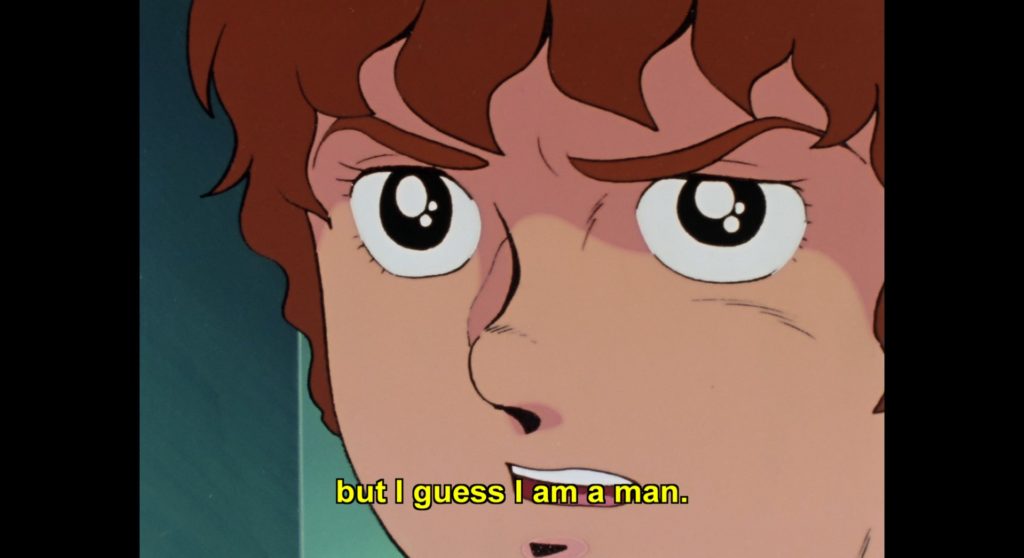
When Amuro refuses to go sortie, Bright slaps him and says, “I thought you were someone who could surpass Char.” Fraw, who was watching from the side, said, “I’m going to pilot the Gundam,” and the scene that followed was really good. It’s the moment when a boy becomes an adult. This is my favorite line that shows Amuro’s determination to go to the battlefield knowing that he has the power to protect his friends.
I also like the line from Char’s Counterattack, “I’m not as impatient as you are, I’m willing to wait for humanity to learn and grow!” That scene is good, and it’s really cool with the exciting lines, isn’t it?
In Char’s Counterattack, in contrast to Zeta, there were many hot and intense exchanges with Char.
In Zeta, on the surface there was a form of cooperation, but I don’t think it was ever the case that Amuro really trusted or sympathized with Char. He’s definitely thinking, “he’s acting like a leader in the AEUG now, but really it’s just a means to an end for him” as his gut feeling probably warned him. It was the same for Quattro, and I think that they had a working relationship with each other. That’s why they parted ways again with Char’s Counterattack, and I felt that they were finally able to clash with each other honestly.
I think that Amuro and Char have the same ultimate goal, the ideal of human innovation. However, their ideologies are incompatible with each other, and the means to reach that goal are completely different. In contrast to Char, who believes that sacrifices are inevitable in order to carry out his cause, Amuro is kind at heart, so he can’t allow victims for the sake of his goal. Also, he doesn’t agree with Char’s way of using women as tools in battle, so even if their goal is the same, their paths to get there never cross.
What do you think about the ending of “Char’s Counterattack,” in which both characters go missing?
As for the battle between Amuro and Char, I think I won. Amuro wins when he stops Axis from falling to Earth and crushes Char’s ambitions.
In terms of the story, both Amuro and Char went missing, but their battle had already been settled, and I myself was satisfied with that. Some of the fans may have wanted the outcome of the rivalry showdown in their mobile suit battle to be black and white. Even if that had happened, I believe that Amuro would have been able to defeat Char, but he is a gentle man… I am sure that he would not have gone so far as to deliver the finishing blow to him.
His biggest rival is “25-year-old Tōru Furuya”
How did you feel when it was decided that Mobile Suit Gundam: THE ORIGIN (hereafter referred to as ORIGIN) would be made into films?
It’s a story that predates Gundam, so I thought I would never play 8-year-old Amuro. I was surely expecting an actress to be the cute Amuro instead. Yasuhiko-san (Yoshikazu Yasuhiko, the author of ORIGIN) personally asked me to do it, so I couldn’t help it. I gave it a try, but as expected, it wasn’t cute (laughs).
Fortunately, 8-year-old Amuro only had one scene, and there weren’t many lines, so I feel like I managed to do it somehow. After that, I was confident that I could play 15-year-old Amuro at the age of 55, so I had a lot of fun doing it.
It looks like your connection with Amuro Ray is likely to continue.
For me, the strongest image I have of Amuro Ray is as a boy in Gundam. My favorite is the cool adult Amuro from Char’s Counterattack, but I’m proud that Amuro from Gundam was the first character that I carefully crafted. In my own interpretation, I intended to play him in a unique way. So if the idea of remaking Gundam comes up, I definitely want to do it again. After being Amuro Ray for this long, he’s already “my own alter ego.” Of course I don’t want to give it away to anyone.
Amuro is also active outside of animation, such as in games.
I’m grateful. However, most of my work in games is basically re-recording lines that I did in the past. In situations like that, I want to reproduce the voice of that time as much as possible, so I sometimes feel that it is rather difficult as I have built up my career.
When Gundam was recorded, I was 25 and Amuro was 15. For me at the time, 15 years old was only 10 years ago, so it was easy for me to intuitively imagine things like, “I was like this when I was 15.” I think that’s why I was able to play it so realistically and lively. But for me now, 15 years old is a long time ago. I’ve had a good career since then, but I’ve lost the sensibility I had when I was 25 years old. There are performances that I could only have done in those days. Regarding Amuro, that’s why 25-year-old Tōru Furuya is my biggest rival. I don’t think I can win at all at this point (laughs).
I’ve been involved in a lot of work since Gundam, and I’ve been doing narration work for a long time, so I’ve learned a lot about voice techniques. Especially when it comes to narration, it’s important to convey the content accurately without revealing your emotions, so in a way, it’s the complete opposite of anime voice acting. Now that I have acquired such skills, I feel that it is really difficult to reproduce the scenes I performed at 25, when 15-year-old Amuro explodes with emotions.
Is there anything you are trying to do to not lose to 25-year-old Tōru Furuya?
Physical fitness training. Then recreation! I love outdoor sports, so now I go snowboarding every week. I used to ski for over 40 years, but I started snowboarding because I wanted to have a more exciting experience.
At first, I kept falling down and things didn’t go well at all, and I was really scared, but the thrill I felt at that time was something I hadn’t experienced in a very long time, and I thought it was important for a performer to hold on to this feeling. I thought it would come alive when I play a teenage boy. I don’t want to forget the excitement of little things as I get older, or lose my naive sensibility and become fearless.
These days, I rarely get nervous standing in front of a microphone, so I try to push myself to increase the tension by telling myself, “If I don’t do this job perfectly, I won’t be able to live tomorrow.” (laughs).
Amuro is his alter ego and his lifework
This summer, Mobile Suit Gundam: Hathaway’s Flash (hereafter, Hathaway’s Flash) will finally be released in theaters. Please tell us your expectations for the new generation of Gundam works.
As a Gundam fan, I’m just as excited about Hathaway’s Flash as you are. As one of the original contributors to Gundam, I also believe that it will not always be Amuro and Char who will lead the series into the future, so I hope that Hathaway’s Flash will once again be a hit for the Gundam series and give birth to new heroes and attract new fans.
What kind of existence is Amuro Ray to you, Furuya-san?
As I mentioned earlier, he is truly my alter ego, having walked through life together. We met when I was 25 and have been together for 40 years. It really is now a life’s work for me. If I hadn’t met Amuro, Tōru Amuro from Detective Conan wouldn’t have existed either (laughs). Thanks to him, I’m happy to be blessed with a new representative work.
Finally, if you had to give some words to Amuro, what would they be?
From the bottom of my heart, I want to say “thank you for being born” to Amuro. I really have nothing but gratitude. And “I’m looking forward to working with you from now on”.
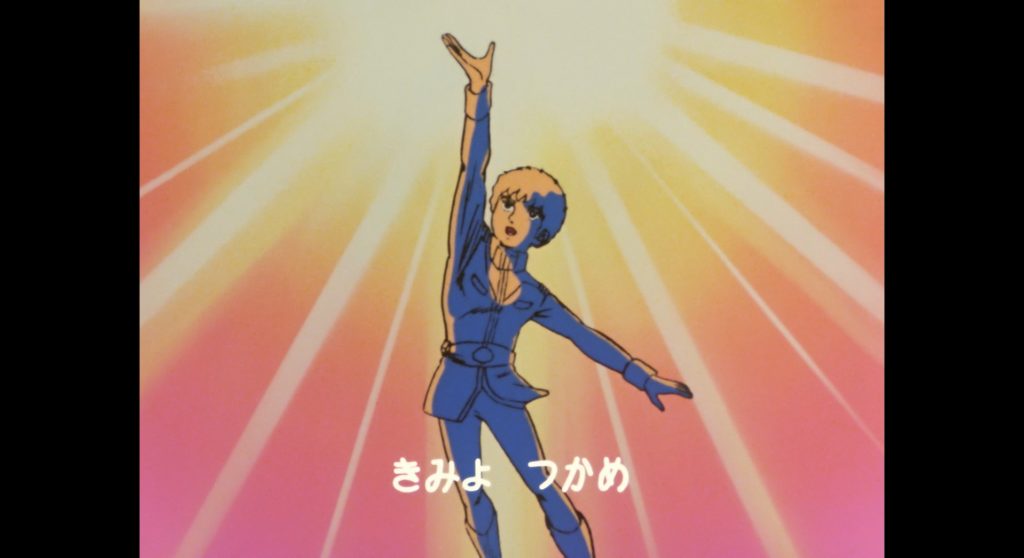
PROFILE
Tōru Furuya (古谷徹)
He has been active as an actor since childhood. When he was a junior high school student, he suddenly became a popular voice actor with the role of Hyuma Hoshi, the main character of Star of the Giants. After that, when Mobile Suit Gundam, in which he played the role of the main character Amuro Ray, recorded an unprecedented hit, he continued to play the role of Amuro enthusiastically in its sequels, Mobile Suit Z Gundam and Mobile Suit Gundam: Char’s Counterattack. Recent representative works include Pegasus Seiya in Saint Seiya, Yamcha in Dragon Ball, Tōru Amuro in Detective Conan, and Sabo in ONE PIECE, and many TV narration appearances. He belongs to Aoni Production.
